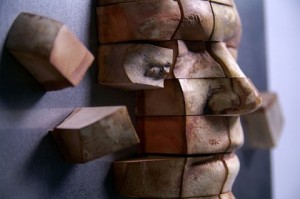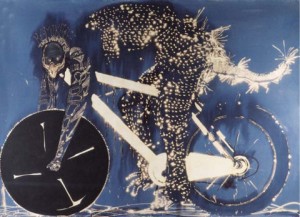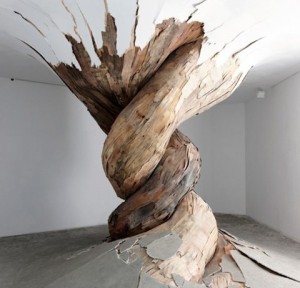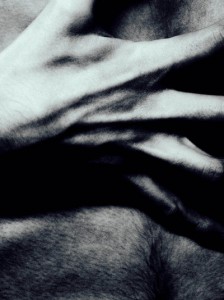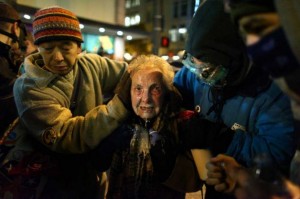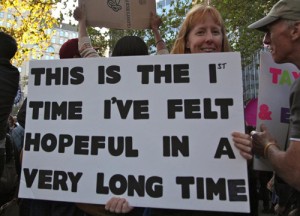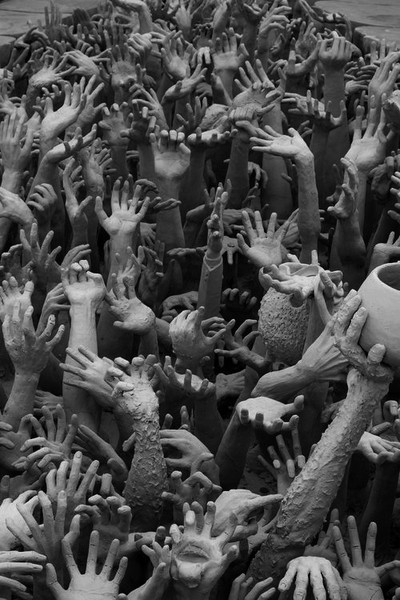.jpg)
I’ve been hanging out a lot lately with my friend Allan, because he’s found himself suddenly and unexpectedly in the desert of his own life. He’s done the things you’re supposed to do, he’s got himself an education, he works hard, he’s reliable. But all of a sudden—you know how these changes happen, it’s happening every day of your life, but when it actually happens, it feels like it’s all of a sudden—all of a sudden you wake up one morning, and your kids don’t feel like your kids anymore, and your partner, the one you’ve grown into for all those years, looks at you with a terrible kind of… disgust, is that too strong a word to use? She says she doesn’t like the way you smell anymore, even your smell is too much, and you wonder if there’s any part of you left that isn’t trash and garbage. And everything that used to be reliable and clear, and I can count on that at least, is up in the air, and if your name wasn’t printed on all the bills you might have lost that too, so when you wake up you find yourself in the desert of your life. You’re wandering, you’re lost.
I think there’s a moment, oh just a moment, I think there’s a moment in everyone’s life that looks like this. You are 12 tribes and exiled, you wave the pharaoh good-bye, you flee the plague years and the bad harvests and you don’t know where you are. Maybe a parent dies. Maybe a relationship ends. Maybe you get hurt or you move. Or someone hurts you or you hurt someone else. The description, the little caption that you like to write underneath every photo ever taken of you, it just sounds like somebody you read about in the newspapers. Not really someone you know very well.
It’s a powerful place to be, this place of not knowing. Most often, it’s experienced as pain. As suffering. I’m suffering so much. Can you feel my suffering? This is what his face asks me every time I see him. And here is the physiology of compassion. Your friend comes to you and says: she doesn’t want to be with me anymore. My children are not my children. My house is not my house. My life is not my life. And because he’s your friend, you feel some of his feelings. There’s a physical sensation in the body, in the frame of the body, so that his bad feelings become your bad feelings.
What do we do when we experience negativity? When we are saying no to what is arising, when we are feeling bad? I think we want to leave that place as soon as possible. The exit door, the skeleton key, the escape hatch, I have a bad feeling and I need to leave. The physiology of compassion. What is the physiology of compassion? Your friend comes to you and he is in distress, and the more he talks about it, the more able you are to listen to it, to receive it, the more you feel bad. You feel bad for him. It’s not just an idea, it’s a physical sensation. And how do you react to that physical sensation? Usually we exert our preference, we say no. No, I don’t want this. And then we take an action in order to get rid of it. How do we get rid of this bad feeling that our friend has given us? How do we give back this unwanted gift?
Often, I think we do this by trying to fix the situation. I’ve got a great book about your problem. My shrink has an opening at 3, why don’t you go see her? I have some spare emotional band-aids, why don’t you try this one? These fixes have the advantage of appearing… of offering the illusion, the mirage of compassion. Here, why don’t you try this? The fix, the fix, the fix is in, is in the house. But very often the fix is just a way to remove my bad feeling. It seems like my words are addressed to my friend, it looks like I’m talking to him, but I’m not. I’m talking to myself. I’m trying to get a fix, I’m trying to get rid of all of this unwanted business over here, in the frame of my body. Just get this off of me will you? I’m going to take all of that bad feeling and smooth it out with the ointment of an idea.
What is the physiology of compassion? What does it feel like, to feel those bad feelings? Perhaps there’s a shortness of breath, a tightening in the chest, a caving in of the shoulders. I’m getting smaller, I’m shrinking, and as I do I can feel you, I can feel your pain. I am your pain. And maybe, today, because it’s not the first day we’ve talked about these problems, and everybody has the same set of problems, again and again… Have you noticed that? Your friends, once you really get to know them, they’re struggling with the same short set of issues, again and again, in all these fine variations and permutations. And because you’re friends, you care about every small nuance, every little detail of difference makes a big difference to you. What did she say? And then what did you say? And sometimes, to be sure, a little advice, a little objective remapping can be helpful. But mostly there is no fix, or nothing you’re going to say is really going to fix or change anything for them. It’s going to change something for you, but it’s not really going to change something for them. Because what your friend is really saying is that there are problems with the roots, there are problems with the ground, the very ground he’s walking on. It’s turned soft and slippery. And even when that ground firms up, those problems, those deep wounds, those deepest of all wounds, are still going to be there. Some new relationship, some new deal might have been struck, some new stories or tools might be used to negotiate them, but they’re still gonna be there.
I think the heart of friendship is not about fixing, or offering a better idea, or coming up with a strategy. I don’t think friendship is really about cooking up strategies for how to live. I think the heart of friendship is about holding a space for each other. So when your friend comes and they’re suffering so much you can just sit there and hold it, even though it makes you feel bad, it doesn’t matter, this person is your friend, in this moment of opening you are part of each other, you open your heart even though it’s painful. You just hold it, and you don’t try to fix it and you don’t try to change it. It’s such a powerful thing to do. Has anyone ever done this for you? Have you ever done this for someone else? It’s such a powerful action, an action which here in the west might not look like an action. But I think this is what we really want, each of us, when we’re in pain. When we’re touching that part of us that hurts, that’s so small and terrible and terrified and rejected , and even the whisper of a breath is enough to bruise us. I think what we really want is to be held, is to be held in that place. Because fixing is already a judgment, fixing is already a way of saying no, I say no to your smallness, your pain, your difficulty, let’s get out of there as soon as possible.
Everyone will love me when I’m smart and shining and telling my smart, shiny jokes. But who will love in the other place, when I’m so small I can hardly be seen, howling out the old terrors, angry and afraid? Who could hold me then?
How might we turn towards that place inside ourselves that we refuse, to make room for our unreasonable too muchness, our short and long comings, our dictators and tyrants? How to open to these cast away parts of our personalities, admit them and allow ourselves to be held there? How might we allow ourselves also this primal softness, could we call it that, this primal softness, and allow ourselves to be held without judgment, without trying to fix anything.
This gesture of holding is one the British psychologist Donald Winnicott deems the foundational gesture of interdependence, of the formation of a personality. He uncovers it via close observation of mothers immediately after the second world war, in an England that had been bombed and blazed, where thousands of new graves bore the names of a generation grown old before its time. In the rubble, in the desert of this country, there were mothers reaching out for and holding their children. How do you hold your children, hold space for all of your unwanted children? Without judgment? And what might that look like as a practice? Is there a place where you can go to practice your compassion? Your primal softness. To practice your ability to hold space for your friends, and even perhaps, for those who are not your friends.
I think that’s why some of us are here today. Because the place where we can model or learn to exercise compassion, is exactly here, on the cushion. We’ve come here to sit in this old form, where so many others have come to sit like us, for centuries past, in countries around the world. They’re all here with us, and they’re all not here with us. We are part of a line, a single gesture across time, holding stillness, holding this place of stillness, of softness, century after century, like passing the Olympic flame of softness, keeping that hope alive. We are sitting in the gesture, the mudra, the seal of the Buddha, as if we were not ourselves, I mean, as if we were not only a launching pad for saying I like that, I don’t like that. To hold space as if we were not judge and jury, instead content on holding the space of not knowing, the space of compassion.
There are two parts to today, or perhaps there’s a thousand parts masquerading as two parts, or perhaps you could pick up both parts in your hands, and turn them and find that behind each one is the face of the other. There’s two parts, let me offer this crude butcher’s version of events, and in the first, the invitation this morning is to make a pilgrimage, a journey, to wander through the desert of your own life. And to use as your guide the reliable, steady, traveling companion of your breath. To follow it step by step, inhale by inhale, exhale by exhale, to yoke attention to the movement of the breath, so that we can arrive at this moment, at this moment, here in this room. To hold the space of this room, all of us together. Without having to fix the room, without having to the change the room. Things might come up along the way, difficult things, not difficult things, thoughts, and there’s no need to fix your thoughts. There’s no need to have better thoughts, or to have better feelings. Perhaps we don’t have to fix our bad feelings or our good feelings today. Perhaps we could act as our own best friend, our own authority, and hold space, and hold this space, that is the very root, that is the very heart of compassion.
There is a space in this city that is also a space of holding. All around this space there are human animals filled with certainty, filled with designs and maps and plans and forecasts about how things should be. About what the next moment holds. About who they are. They too might be in the desert of their life, but they’re too busy being busy to notice. Just like me. Just like you. And amidst all these systems and circulations of today’s to-do lists, there is a green space in the middle of the city where they are building, where they living, a new old world. A hundred people, more or less, living in tents and yurts, swollen to ten times, twenty times that size in the evening, during the marches. Already this space, this park co-owned by the St. James Church and the city, is leaking into the city, is leaking into this room, and in other rooms that look very different from this room. This park is holding a space for the 99%, the ones you don’t read about in the newspaper, the ones who have been left behind, the homeless, the incurable, the ones no one wants. The young who have already grown old, the aged who have grown tired of having pills instead of feelings, the indigenous people whose land has been stolen, whose treaties have been violated, whose communion with this ken-ah-te… Canada, is, ironically enough, a word derived from a native word—this is how we bury our dead, our dead voices, our shame and fear, we cover them over with a name, like this: Canada. It bears the reminder, like a wound, the name is like a wound, a memorial, it comes from the native word ken-ah-te, or “a cluster of small dwellings.” There is a new Canada taking root in St. James Park, and there are other Canadas sprayed across the geography, in Kingston, in Windsor, in Calgary, in hundreds of places around the world people are gathering in order to bear witness to an economic system that has been designed to benefit the few at the expense of the many, at a political system that calls itself democracy, but when the people of that democracy begin to express ourselves, not just at the ballot box, but when we take to the streets during the G20 summit, or when we arrive at Queen’s Park asking that promises be kept, then we see the police arrive, as we have seen the police arrive in city after city, across this country, across this world, in order to protect this country from what exactly? From the people. From democracy I guess. From unarmed people practicing non-violence. I’m sure you’ve all seen the image of Dorli Rainey, the 84 year old woman who was tear gassed in Seattle by the police.
What is happening today, at this moment, in this city, at this moment? Across the country, at this moment, in cities around the world, in London, in Tokyo, in Johannesburg, people are gathered together to bear witness to the wounds of their cities. And they have arrived the way your best friend might come, not in order to tell you: this is what I want, this is how I’m going to fix it. But first of all, first of all the impetus is to hold space. In other words, in a collective gesture, in a social space, the space of us, we are enacting the physiology of compassion. We are not thinking about compassion, we are compassion. When we are holding that space, this park in this city, today at this moment, we are occupying, and we are occupying with compassion.
Perhaps you’ve heard, it’s what the mainstream media keeps stuttering. The Occupy people don’t have a list of demands. They don’t know what they want. In other words, the occupy movement is holding space. It’s not a single issue campaign, it’s not like the campaign against the death penalty for instance, or the campaign for universal health care, or a women’s right to choose. This isn’t a campaign it’s a movement. It’s a global movement and it has changed the conversation in this country and in many other countries.
A few words from my friend Judy Rebick: “In New York, several times I found myself talking to a middle aged man who after a few minutes I realized was homeless. We were discussing what was happening on the site and what the latest news was. He didn’t have to ask me for anything because all his needs were provided so we spoke as equals. On the Occupy site, he was no longer a beggar. In some ways the Occupy sites are a fundamental expression of solidarity with homeless people who shamefully live so badly in a country where there is so much wealth. A young man in Halifax told me he first came to Occupy because he disagreed with a system that so benefitted the rich but since he had been there, he has become a passionate about homelessness and mental health issues. “I have gotten to know people here that I would never talk to in my regular life and see what terrible injustices they face.”
The young man in Halifax leaves his house. What is his house? It is the place I know. It is the place I put the things that I know. It is the familiar, the tried and true, the reliable. And then the young man leaves his house. Is this the place where friendship begins, where compassion can really take root? When we leave our house?
Perhaps this young man too was feeling the desert in his life. And he goes to join Occupy in Halifax, not because he’s certain, not because he knows, but he goes there the way your best friend comes to you when you’re broken and sad. Your best friend sits beside you, all ears, as they say. I’m all ears, ready to hold whatever you’re going to say. This young man becomes his own best friend, he enters this new place, that is not home, that is not familiar, in order to bear witness, in order to drop his preferences, in order to hold a place for the people who are suffering in his city. He becomes his own best friend, and he does this by leaving home, perhaps a bit like the way you left home this morning. Or tell me, have you really left home? Have you really left it? Or is still here, oh wait, I think I smell pancakes, I must be still home.
What does it mean to come here, to be in this room? Perhaps it means leaving home, like the young man who leaves home in order to become the best friend of a whole neighbourhood, and then he becomes the best friend of the whole city. This is what he says: “I have gotten to know people here that I would never talk to in my regular life.” What is Occupy exactly? My irregular life? Why is that extending kindness to strangers, even to speak to strangers, why is that unusual? Is it because we have to leave home in order to do that, and we don’t want to leave home? Is it so that can we stay inside the rooms that we already know, and keep fixing, keep offering our fixes, our recipes, our strategies for living, inside the frames of the rooms we already know? Being in this moment, this moment, this moment here in this room, doesn’t this also mean: leaving home? To leave everything that you think you know behind, in order to enter this moment in all of its luxurious unfolding.
To follow the breath, the course of the breath which will lead us again and again back to this moment. Could we fashion a new home, a home of the unfamiliar, a home dedicated to bearing witness, where no moment is the same as any other moment? It is a home where we might sit, like our best friend sits, without judgment, without “This is good and this is not good.” Can we sit in a place without home in order to uncover the radical kindness, the radical “to the roots” kindness that is touching the roots of our city, even now, even now at this moment? Even now in Hong Kong, even now in Bombay, in Boston, even now in Madrid, people are leaving home so that they can create, so that they can occupy a homeless home, so that we can become again the friends of our cities. The friends of our country. Why not be led by our best friend, and leave home so that we can be here together, here, in this moment. Perhaps we are what we’ve been waiting for.
